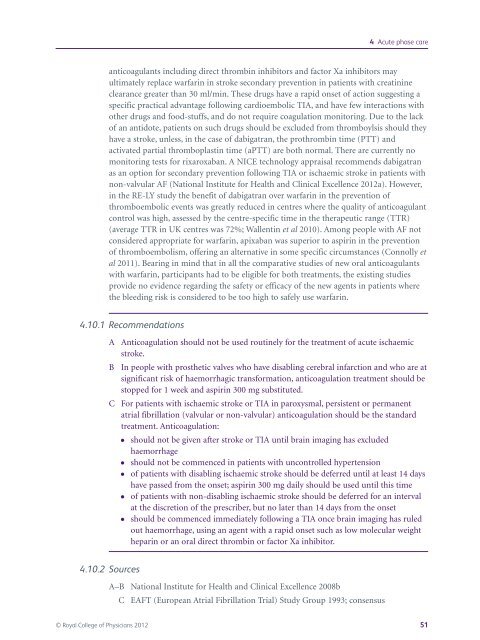national-clinical-guidelines-for-stroke-fourth-edition
national-clinical-guidelines-for-stroke-fourth-edition
national-clinical-guidelines-for-stroke-fourth-edition
Create successful ePaper yourself
Turn your PDF publications into a flip-book with our unique Google optimized e-Paper software.
anticoagulants including direct thrombin inhibitors and factor Xa inhibitors may<br />
ultimately replace warfarin in <strong>stroke</strong> secondary prevention in patients with creatinine<br />
clearance greater than 30 ml/min. These drugs have a rapid onset of action suggesting a<br />
specific practical advantage following cardioembolic TIA, and have few interactions with<br />
other drugs and food-stuffs, and do not require coagulation monitoring. Due to the lack<br />
of an antidote, patients on such drugs should be excluded from thromboylsis should they<br />
have a <strong>stroke</strong>, unless, in the case of dabigatran, the prothrombin time (PTT) and<br />
activated partial thromboplastin time (aPTT) are both normal. There are currently no<br />
monitoring tests <strong>for</strong> rixaroxaban. A NICE technology appraisal recommends dabigatran<br />
as an option <strong>for</strong> secondary prevention following TIA or ischaemic <strong>stroke</strong> in patients with<br />
non-valvular AF (National Institute <strong>for</strong> Health and Clinical Excellence 2012a). However,<br />
in the RE-LY study the benefit of dabigatran over warfarin in the prevention of<br />
thromboembolic events was greatly reduced in centres where the quality of anticoagulant<br />
control was high, assessed by the centre-specific time in the therapeutic range (TTR)<br />
(average TTR in UK centres was 72%; Wallentin et al 2010). Among people with AF not<br />
considered appropriate <strong>for</strong> warfarin, apixaban was superior to aspirin in the prevention<br />
of thromboembolism, offering an alternative in some specific circumstances (Connolly et<br />
al 2011). Bearing in mind that in all the comparative studies of new oral anticoagulants<br />
with warfarin, participants had to be eligible <strong>for</strong> both treatments, the existing studies<br />
provide no evidence regarding the safety or efficacy of the new agents in patients where<br />
the bleeding risk is considered to be too high to safely use warfarin.<br />
4.10.1 Recommendations<br />
A Anticoagulation should not be used routinely <strong>for</strong> the treatment of acute ischaemic<br />
<strong>stroke</strong>.<br />
B In people with prosthetic valves who have disabling cerebral infarction and who are at<br />
significant risk of haemorrhagic trans<strong>for</strong>mation, anticoagulation treatment should be<br />
stopped <strong>for</strong> 1 week and aspirin 300 mg substituted.<br />
C For patients with ischaemic <strong>stroke</strong> or TIA in paroxysmal, persistent or permanent<br />
atrial fibrillation (valvular or non-valvular) anticoagulation should be the standard<br />
treatment. Anticoagulation:<br />
● should not be given after <strong>stroke</strong> or TIA until brain imaging has excluded<br />
haemorrhage<br />
4.10.2 Sources<br />
● should not be commenced in patients with uncontrolled hypertension<br />
● of patients with disabling ischaemic <strong>stroke</strong> should be deferred until at least 14 days<br />
have passed from the onset; aspirin 300 mg daily should be used until this time<br />
● of patients with non-disabling ischaemic <strong>stroke</strong> should be deferred <strong>for</strong> an interval<br />
at the discretion of the prescriber, but no later than 14 days from the onset<br />
● should be commenced immediately following a TIA once brain imaging has ruled<br />
out haemorrhage, using an agent with a rapid onset such as low molecular weight<br />
heparin or an oral direct thrombin or factor Xa inhibitor.<br />
A–B National Institute <strong>for</strong> Health and Clinical Excellence 2008b<br />
C EAFT (European Atrial Fibrillation Trial) Study Group 1993; consensus<br />
4 Acute phase care<br />
© Royal College of Physicians 2012 51


